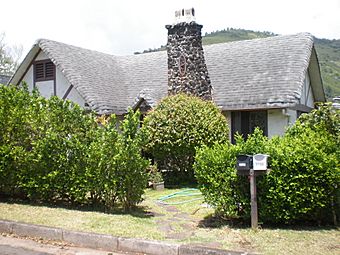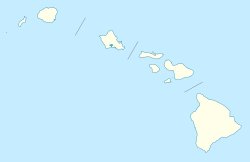George D. Oakley House facts for kids
Quick facts for kids |
|
|
George D. Oakley House
|
|

View from street
|
|
| Location | 2110 Kakela Pl., Honolulu, Hawaii |
|---|---|
| Area | 6,991 sq. ft. |
| Built | 1929 |
| Architect | Miles H. Gray |
| Architectural style | English Tudor cottage |
| NRHP reference No. | 84000249 |
| Added to NRHP | 15 November 1984 |
The George D. Oakley House is a historic home in Honolulu, Hawaiʻi. It was built in 1929. This house is a great example of the English Cottage style. This type of architecture was very popular in Hawaiʻi during the 1920s and 1930s.
This house is one of the best examples of this style in the state. Only about two dozen similar houses still exist. The house was added to the National Register of Historic Places in 1984. This means it is recognized as an important historical building.
Contents
About the House's Design
The George D. Oakley House has many unique features. These features make it a special example of the English Cottage style.
Unique Architectural Features
The house has an asymmetrical massing. This means its parts are not perfectly balanced on both sides. The roof is shaped to look like thatch. Thatch is a traditional roofing material made from straw or reeds.
The front of the house has a gable with half-timbered walls. Half-timbering means you can see the wooden frame of the house on the outside. Inside, the living room has a king post truss ceiling. This is a special type of roof support that looks very strong and decorative.
Windows and Details
The house features diamond-shaped casement windows. These windows open outwards like a door. You can also see beautiful and useful wrought iron details. Wrought iron is a type of metal that can be shaped into fancy designs.
There is even a tiny window built into the chimney! The architect for this house was Miles H. Gray. He was an engineer who worked for the U.S. Army.
Special Basement Floor
The basement floor is also very unique. It is made of acid-stained decorative concrete. This special technique makes the concrete look colorful and patterned. It was a new idea in the 1920s. Robert D. Lammens was a pioneer in this technique. The floor in the Oakley House is a rare example that still exists today.
Who Was George D. Oakley?
George Oakley was the original owner of this special house. He had an interesting life and helped bring famous musicians to Hawaiʻi.
Early Life and Work
George Oakley was born in Scotland. He came to Hawaiʻi in the 1910s after living in the mainland U.S. In 1920, he married Dean Spry. They first lived in Kāneʻohe, where George managed a pineapple farm.
After the farm closed in 1923, George found new work. He became a linotype operator for local newspapers. A linotype machine was used to set type for printing newspapers. He also worked as a writer. He retired from the newspaper business in 1948.
Music and Community
During the 1930s, George Oakley became the music editor for the Honolulu Star-Bulletin newspaper. He wrote a regular column called "Music on the Tradewinds."
The Oakley family also started a business called Artists' Services of Honolulu. This business helped bring famous musicians to perform in Honolulu. Between the 1930s and early 1960s, they brought many talented artists. These included Yehudi Menuhin, Arthur Rubenstein, and the Vienna Boys Choir.
The house was later put up for sale in 2010 for about $1.2 million.
Gallery










